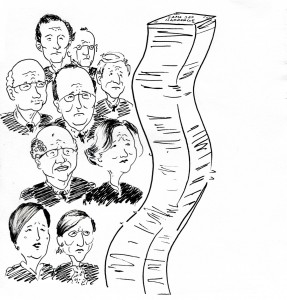Posted on 08 April 2013.
Imagine for a moment what it is like to be gay, lesbian, bisexual or transgender growing up in Texas — an area known for its deep spirituality and history of being less than friendly to anyone not straight and white.
Imagine growing up in a conservative household where dating anyone who is not the opposite sex and does not have the same skin color is so taboo, it could rip the family apart.
Imagine carrying that weight all throughout your childhood and into your high school years, where LGBT groups for young people are rare outside of the cities. From some of the college tours you have taken, you discovered there are actually centers full of people your age just like you, staffed with people who can help you cope with the confliction and pain, who are there to let you know that you’re not alone and to lend you the support you might not otherwise get at home.
Now imagine showing up at a public university anywhere in Texas and find the campus LGBT group has closed shop because it did not have the funds to operate, and suddenly, you are alone again.
This was the future we faced if state Rep. Bill Zedler, R-Arlington, had had his way.
The representative filed an amendment April 2 to the general appropriations act, SB1, which would have prevented public universities and colleges from funding LGBT resource centers and other “gender and sexuality and related student centers.”
It comes as no shock that state politicians want to attack educational institutions and students yet again. In the past few years, the state has slashed its education budget, forcing the layoffs of thousands of public elementary and secondary school teachers statewide. This was not the first time state politicians attacked LGBT students specifically, either.
According to the Dallas Voice in May 2011, then-state Rep. Wayne Christian, R-Center, filed two amendments to SB 1811 — one which would require public universities to equally fund centers for “family and traditional values,” while the other would prohibit state funds being spent on campus LGBT resource centers and prohibit universities from housing them on campus.
Christian eventually dropped the amendments because State House Democrats threatened to sabotage the bill they were attached to. The Zedler Amendment is just the latest wave of legislative bigotry so poorly disguised it borders on insulting.
“Funding of Gender and Sexuality Centers and Related Student Centers: An institution of higher education may not use money appropriated to the institution under this Act, or any property or facility of the institution funded by appropriations under this Act, to support, promote, or encourage any behavior that would lead to high risk behavior for AIDS, HIV, Hepatitis B, or any sexually transmitted disease,” the Zedler Amendment said.
Judging from the language of the bill, the intent seems rather obvious — Zedler is taking up the cause of his Republican colleague in the State House, Christian, by offering this amendment to force universities to stop funding LGBT resource centers.
This would push the operational costs on to students to pay for the centers through student fees, and at universities like Texas A&M University, where the Student Senate introduced a bill to allow students to opt out of paying their LGBT Resource Center fees on religious objections, such centers statewide could have folded over the course of a few years.
That’s on the surface, though, and bills can be applied in other ways and to other people beyond the original intent.
For example, take the UH Women’s Resource Center — a place on campus where female students can go to get information on a variety of topics, to educate the UH community on topics that concern women, identify and research issues that affect UH women, among other things.
Seems innocent enough, until you discover that on the WRC’s homepage, there’s a link to a video showing women how to use a condom, an advertisement of weekly discussion called Gender Talk that discusses gender issues that go beyond just women’s issues, but stretch to men and transgender people as well and a link to a website called feminist.com which serves as a link hub to several websites offering health and sexual information, including websites devoted to abortion.
By the definition of the Zedler Amendment, any opponent of the WRC could petition the university to pull its funding because it indirectly promotes abortion and Gender Talk somewhat promotes LGBT values. Ignoring the fact the WRC links a video promoting safe sex on its homepage or that the third-party website in question also provides links to website educating about the dangers of STDs, the flimsy justification could be enough to pull the WRC’s funding and any other women’s resource center that promotes or educates students about sexuality.
The language of the amendment itself was so vague that any resource center that attempts to educate students on sexuality could have been perceived as promoting promiscuous or “high risk behavior,” and as such, the amendment was too broadly written. On the other hand, if it had been any more narrowly defined, the amendment would have been construed as discriminatory, just as the justification for this amendment was discriminatory, promoting the stereotype that LGBT lifestyles promote STDs and promiscuous behavior.
According to aids.gov, “men who have sex with men” consisted of 61 percent of new HIV infections in 2009 (heterosexuals making up 27 percent of new infections) while making up nearly half, 49 percent, who lived with HIV in 2008. However, that in and of itself is not an indictment of LGBT resource centers, which provide information and services to educate young LGBT adults about sexual health, which helps keep those HIV numbers down. By taking away that resource, only the opposite is achieved.
This bit of legislative insensitivity was quickly laid to rest Friday on the state House floor as Zedler’s legislative director announced that the senator had “pulled down” the amendment. Most likely this also stemmed from threats by House Democrats to derail the appropriations bill. Along with Zedler’s amendment, the Texas A&M “LGBT Opt-Out Bill,” later redubbed the “Religious Exemption Bill,” was vetoed on the same day by student body president John Claybrook.
If Zedler or anyone else wants to argue against publicly funding student LGBT resource centers on religious grounds, that’s fine; there is merit in that discussion. If you don’t agree with LGBT lifestyles, that’s your choice, but at least come out and say, “I don’t think homosexuality is right because it’s a sin.” We won’t agree, but that is your First Amendment right and you’ll gain respect for your candor. Zedler, through his amendment, showed no candor in his blatant discrimination, hiding behind the excuse that the state does not want to promote “high risk behavior” when heterosexuals still account for one in four new HIV infections. If the true aim of this amendment was to mitigate STDs, then taking away resources of education that encourages safe sexual behavior is accomplishing the exact opposite.
Aaron Manuel is a print journalism senior and may be reached at opinion@thedailycougar.com.







